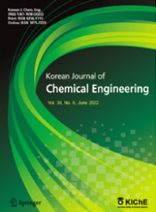Articles & Issues
- Language
- English
- Conflict of Interest
- In relation to this article, we declare that there is no conflict of interest.
- Publication history
-
Received December 24, 2014
Accepted March 30, 2015
-
 This is an Open-Access article distributed under the terms of the Creative Commons Attribution Non-Commercial License (http://creativecommons.org/licenses/bync/3.0) which permits
unrestricted non-commercial use, distribution, and reproduction in any medium, provided the original work is properly cited.
This is an Open-Access article distributed under the terms of the Creative Commons Attribution Non-Commercial License (http://creativecommons.org/licenses/bync/3.0) which permits
unrestricted non-commercial use, distribution, and reproduction in any medium, provided the original work is properly cited.
Copyright © KIChE. All rights reserved.
All issues
Desulfurization of coke oven gas using char-supported Fe-Zn-Mo catalysts: Mechanisms and thermodynamics
1Key Laboratory for Advanced Coal and Coking Technology of Liaoning Province, School of Chemical Engineering, University of Science and Technology Liaoning, Anshan 114051, China 2Chemical Engineering, University of Newcastle, Callaghan, NSW 2308, Australia
Korean Journal of Chemical Engineering, November 2015, 32(11),
10.1007/s11814-015-0059-1
10.1007/s11814-015-0059-1
 Download PDF
Download PDF
Abstract
Sulfidation properties of char-supported Fe-Zn-Mo sorbents prepared by ultrasonic impregnation method were investigated during simultaneous removal of H2S and COS from coke oven gas (COG) using a fixed-bed quartz reactor. Sorbent samples before and after sulfidation were analyzed using X-Ray diffraction (XRD) and Fourier transform infrared spectroscopy (FT-IR). The experimental results showed that the addition of Mo significantly improved the desulfurization properties (i.e., breakthrough time, sulfur capacity and desulfurization efficiency) of Fe-Zn sorbents. Desulfurization reactions were exothermic and thermodynamically favorable in the temperature range of 200-400 oC. Thermodynamc analysis of the sorbents indicated that higher concentration of H2S and lower concentration of H2 favors the reaction of metal oxides with H2S to form metal sulfides.
References
LEPPALAHTI J, KOLJONEN T, Fuel Process. Technol., 43(1), 1 (1995)
van der Drift A, van Doorn J, Vermeulen JW, Biomass Bioenerg., 20(1), 45 (2001)
Cheah S, Carpenter DL, Magrini-Bair KA, Energy Fuels, 23, 5291 (2009)
Kang SH, Lee SJ, Jung WH, Chung SW, Yun Y, Jo SH, Park YC, Baek JI, Korean J. Chem. Eng., 30(1), 67 (2013)
Meng XM, de Jong W, Pal R, Verkooijen AHM, Fuel Process. Technol., 91(8), 964 (2010)
Novochinskii II, Song CS, Ma XL, Liu XS, Shore L, Lampert J, Farrauto RJ, Energy Fuels, 18(2), 584 (2004)
Yin FK, Yu JL, Dou JX, Gupta S, Moghtaderi B, Lucas J, Energy Fuels, 28(4), 2481 (2014)
Zheng XR, Bao WR, Jin QM, Chang LP, Xie KC, Energy Fuels, 25(7), 2997 (2011)
Garces HF, Espinal AE, Suib SL, J. Phys. Chem. C, 116, 8465 (2012)
Xie W, Chang LP, Wang DH, Xie KC, Wall T, Yu JL, Fuel, 89(4), 868 (2010)
Ahmed MA, Alonso L, Palacios JM, Cilleruelo C, Abanades JC, Solid State Ion., 138(1-2), 51 (2000)
Liu GQ, Huang ZH, Kang FY, J. Hazard. Mater., 215-216, 166 (2012)
Dhage P, Samokhvalov A, Repala D, Duin EC, Bowman M, Tatarchuk BJ, Ind. Eng. Chem. Res., 49(18), 8388 (2010)
Park YC, Jo SH, Ryu HJ, Moon JH, Yi CK, Yoon YS, Baek JI, Korean J. Chem. Eng., 29(12), 1812 (2012)
Ozaydin Z, Yasyerli S, Dogu G, Ind. Eng. Chem. Res., 47(4), 1035 (2008)
Slimane RB, Abbasian J, Ind. Eng. Chem. Res., 39(5), 1338 (2000)
Wang DH, Yu JL, Chang LP, Wang DM, Chem. Eng. J., 166(1), 362 (2011)
Yin FK, Yu JL, Gupta S, Wang SY, Wang DM, Dou JX, Fuel Process. Technol., 117, 17 (2014)
Zhao H, Zhang DX, Wang FF, Wu TT, Gao JS, Process Saf. Environ. Protect., 87(4), 274 (2009)
Bao WR, Zhang ZY, Ren XR, Li F, Chang LP, Energy Fuels, 23(7), 3600 (2009)
van der Drift A, van Doorn J, Vermeulen JW, Biomass Bioenerg., 20(1), 45 (2001)
Cheah S, Carpenter DL, Magrini-Bair KA, Energy Fuels, 23, 5291 (2009)
Kang SH, Lee SJ, Jung WH, Chung SW, Yun Y, Jo SH, Park YC, Baek JI, Korean J. Chem. Eng., 30(1), 67 (2013)
Meng XM, de Jong W, Pal R, Verkooijen AHM, Fuel Process. Technol., 91(8), 964 (2010)
Novochinskii II, Song CS, Ma XL, Liu XS, Shore L, Lampert J, Farrauto RJ, Energy Fuels, 18(2), 584 (2004)
Yin FK, Yu JL, Dou JX, Gupta S, Moghtaderi B, Lucas J, Energy Fuels, 28(4), 2481 (2014)
Zheng XR, Bao WR, Jin QM, Chang LP, Xie KC, Energy Fuels, 25(7), 2997 (2011)
Garces HF, Espinal AE, Suib SL, J. Phys. Chem. C, 116, 8465 (2012)
Xie W, Chang LP, Wang DH, Xie KC, Wall T, Yu JL, Fuel, 89(4), 868 (2010)
Ahmed MA, Alonso L, Palacios JM, Cilleruelo C, Abanades JC, Solid State Ion., 138(1-2), 51 (2000)
Liu GQ, Huang ZH, Kang FY, J. Hazard. Mater., 215-216, 166 (2012)
Dhage P, Samokhvalov A, Repala D, Duin EC, Bowman M, Tatarchuk BJ, Ind. Eng. Chem. Res., 49(18), 8388 (2010)
Park YC, Jo SH, Ryu HJ, Moon JH, Yi CK, Yoon YS, Baek JI, Korean J. Chem. Eng., 29(12), 1812 (2012)
Ozaydin Z, Yasyerli S, Dogu G, Ind. Eng. Chem. Res., 47(4), 1035 (2008)
Slimane RB, Abbasian J, Ind. Eng. Chem. Res., 39(5), 1338 (2000)
Wang DH, Yu JL, Chang LP, Wang DM, Chem. Eng. J., 166(1), 362 (2011)
Yin FK, Yu JL, Gupta S, Wang SY, Wang DM, Dou JX, Fuel Process. Technol., 117, 17 (2014)
Zhao H, Zhang DX, Wang FF, Wu TT, Gao JS, Process Saf. Environ. Protect., 87(4), 274 (2009)
Bao WR, Zhang ZY, Ren XR, Li F, Chang LP, Energy Fuels, 23(7), 3600 (2009)

